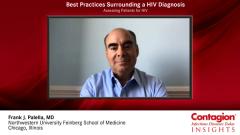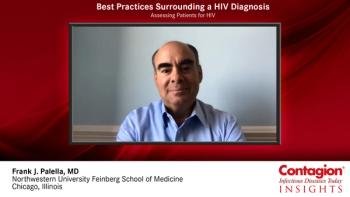
Monitoring Patients for Weight Gain While on HIV Therapy
Recommendations for properly assessing patients who are on HIV treatment for signs of potential weight gain.
Episodes in this series

Frank J. Palella, MD: Historically, when we treated persons with HIV, we considered a modest weight gain upon initiation of therapy and viral suppression to represent—somewhat—a return to health. Particularly for patients who began therapy with very advanced HIV infection, low CD4, high viral load, symptomatic, and possibly low weight, we’ve recognized that the weight gain that can be encountered with particularly some of the newer integrase inhibitors tends to be of a magnitude and a rapidity of increase that isn’t suggestive of merely a return to health.
Part of the challenge has been distinguishing between what could be a return to health and what represents a more concerning excessive, rapid weight gain upon initiation of therapy. In general, we track the overall weight, we look at the BMI [body mass index] categories, we do waist circumference measurements because a rapidly increasing waist is usually or often indicative of increases in visceral adipose tissue, which is the deep abdominal adipose or fat tissue that’s next to muscle, which in the general population has clearly been associated with adverse cardiometabolic factors. This being said, it’s an area of intense clinical investigation to identify both patient types and patterns of weight gain that are warnings of more adverse health consequences.
In general—this is not an agreed-upon consensus—increases in weight after initiating therapy, in excess of 5% to 10% of the pretherapy weight, are considered concerning. In those scenarios we more intensively scrutinize for cardiometabolic potential effects: hyperlipidemia, insulin resistance, diabetes, hypertension, heart disease, liver disease, and things like that. Clinicians had to gauge themselves or be astute within an individual patient as to what their pattern and magnitude of weight change after initiation of therapy has been, whether that patient is already at risk for cardiometabolic disease, and whether the weight gain seems to impact that risk by monitoring sugar, hypertension, blood pressure, and lipids.
Transcript edited for clarity.
Newsletter
Stay ahead of emerging infectious disease threats with expert insights and breaking research. Subscribe now to get updates delivered straight to your inbox.































































































































